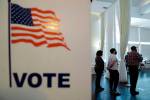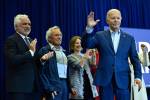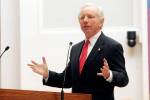Nevada controller: Unexciting yet crucial race
CARSON CITY — The office of controller is a statewide race that typically flies well below the radar, and this election year is no exception.
But the race for the office, pitting state Assemblyman and Democrat Andrew Martin of Las Vegas against university system Regent and Republican Ron Knecht of Carson City, should not be taken for granted by voters. Also running is Independent American candidate Tom Jones.
The position, established in the Nevada constitution, has several important duties that relate to the overall financial health of the state.
The controller is the chief fiscal officer of the state and is responsible for administering the state’s accounting system, settling all claims against the state and collecting debts owed to the state. The controller also serves on the board of directors overseeing the state Transportation Department.
The issue in the race has been mostly about qualifications, and who is best to serve for the four-year term. But the candidates raise broader concerns as well.
Martin, 50, in his first term as a state lawmaker, said his many years of experience as a certified public accountant in the private sector, along with his background as an independent auditor serving two presidents, both at the White House Travel Office and the Executive Office of the President, give him the best background for the job.
“The position requires a lot of accounting background,” Martin said. “It’s not just financial reports but it is also about needing to understand the system of internal controls. The failure to do that, or have the ability to do that in the case of Mr. Knecht, could impact on a lot of different decisions being made by credit markets.”
Maintaining a good credit rating means the state can issue bonds at lower costs, saving taxpayers money, he said.
Knecht, 65, noted there is no requirement to be a CPA to run for the office, and said his much broader range of experience, including as a state lawmaker and regent with a law degree and 40-plus years as an economist and financial policy and technical analyst in both the public and private sectors, make him the better qualified candidate.
“My opponent has been there two years in the Assembly,” he said. “I spent two years in the Assembly and have had numerous appointed offices in Illinois and Nevada. I’ve spent the last eight years on the Board of Regents with experience that is almost perfectly tailored to be controller.”
That experience includes serving as a member and/or chairman of the board’s audit committee, budget and finance committee, and the investment committee, which oversees $1 billion in public investments, Knecht said.
Beyond qualifications, Martin said Knecht is known for being a disruptive influence and a contrarian.
“The controller is someone who has to be impartial and objective and work well with others,” Martin said. “That is not his history.”
Knecht said the claim he is a contrarian has been rejected by three of his colleagues on the Board of Regents who praised him for his work as a chairman of regents committees.
Martin also does not understand his government philosophy, Knecht said.
“I don’t want to privatize all government,” he said. “I am seeking the optimal size, reach and scope of government.”
Knecht said one aspect of the job that Martin has not really addressed is the need to communicate to the public the information they need so they can determine if their tax money is being spent efficiently and effectively.
Andrew countered that the controller’s office has already made such information public on its website at open.nv.gov.
Knecht said his primary goal if elected controller will be to work with other state agencies to replace the state’s antiquated finance/accounting system put into operation in 1998.
Martin said the accounting system is being updated on an ongoing basis. It will likely become a “cloud”-based system but the process has to be done carefully, he said.
Martin said his goals for the office include strengthening the oversight and accountability of the office, collecting debts owed to the state, and linking the tax dollars spent to measurable outcomes on statewide priorities such as high student test scores and lower crime rates.
Both candidates carry some baggage.
For Knecht, it was his firing by the Public Utilities Commission in 2012 on allegations that he conducted political activities during work hours and falsified time cards. Knecht said the charges were trumped up for politically motivated reasons. It all stemmed from when he called into a regents investment committee meeting while at work, he said.
For Martin, it was a finding by a Clark County District judge in 2012 that determined he was not qualified to be a candidate for the Assembly 9 seat because he did not meet the residency requirement.
Martin won most of the votes in the election and was seated in the Assembly when his election was not challenged. Martin said the court decision was rushed and came after a hearing in which he was not allowed to present any evidence.
Contact Capital Bureau reporter Sean Whaley at swhaley@reviewjournal.com or 775-687-3900. Find him on Twitter: @seanw801.




























